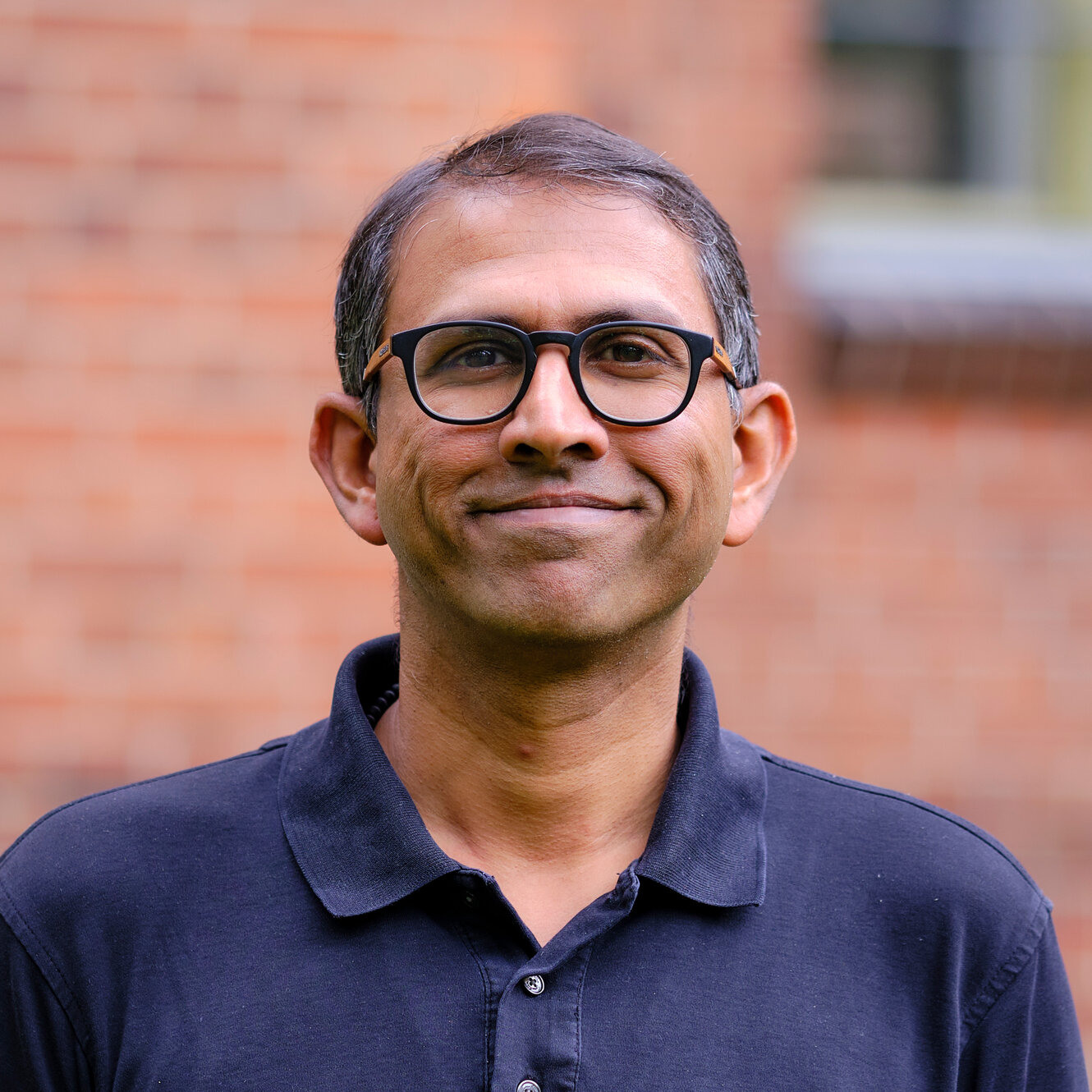Dr. Bharath Ananthasubramaniam

Bharath’s career path is a perfect example of how curiosity connects fields you wouldn’t necessarily expect. Trained as an electrical engineer, his early work focused on how wireless communication works — how phones talk to each other through oscillators and signal transmission.
After finishing his PhD, Bharath wanted to stay in academia but explore something completely new. Biology had always fascinated him, and when he came across an opportunity to study biological rhythms, the connection suddenly made perfect sense: communication systems and living systems both depend on oscillations! Whether it’s data flowing between cell towers or signals coordinating cells and tissues, both worlds speak the same rhythmic language.
His first project took him into marine biology, where he studied how corals synchronize their reproduction — an incredible process in which, on a single night of the year, entire coral reefs release eggs and sperm into the water in perfect coordination. Later, his interest shifted toward the field in which he works today: circadian biology, where the focus is on daily rhythms — the internal clocks that govern everything from sleep to metabolism.
What Bharath particularly appreciates about circadian research is how universal and relatable it is: everyone has an internal rhythm, and everyone has a personal experience with their own biological clock. For him, that makes the science deeply human — a field that connects theoretical ideas, like oscillators and timing, with everyday life.
Brain Bite
Bharath doesn't usually need to set an alarm clock. How about you?
Alarm Clock!
I need an external timekeeper — one that tells me when to wake up, go to work, or get to class. Even if I’ve barely slept, it rings at 7:00 AM sharp. No mercy (unless I find the snooze botton)!
Body Clock!
I have an internal timekeeper — my natural rhythm. It listens to light, temperature, and hormones, not calendars. It wakes me around 8:00 AM, when my body actually wants to start the day.
Bharath's Science in Three 'Languages'
Baby Yoda Level
'As a child, [...] even if you haven't learned, for example, to look at the watch, you don't know how to read time, but nevertheless, you feel when you have to go to bed or you feel hungry when you have to eat your lunch. How do you manage to know this? I mean, how does your body know this? Because there is actually something within your body which tells you, which tells your body that it's time to eat and it's time to go to sleep. And I study how this thing works.'
Doctor Who Explains
'Anecdotally, most of us have a very good idea about our own bodies. [...]If I asked anyone of you, you would tell me if you are, say a morning person or an evening person[...]. And this isn't just your own sort of imagination, but there is actually a biological basis for this [...] This is because [...] you have an internal clock in your body. And of course, it regulates and controls many more things besides just this morningness and eveningness. But that's the mechanism I try to study or how that thing works.'
Einstein Mode
'I work on this internal network of clocks, which is called the circadian system. This regulates many, almost every process in the body with near 24-hour-periodicity. And [...] the source of these clocks is actually at the single cell level. [...] And, of course, since it influences so many things [...] in physiology, breaking this or disrupting this has a big influence[...]. And I'm interested in understanding how these interact with different pathologies. And if we can use this circadian system to help with, curing this pathology and making people more healthy.'
Coming soon…
Current position
| 2021 - present | Independent Group Leader in Theoretical and Computational Biology at the Humboldt-Universität zu Berlin (DE) |
Positions held
| 2024 - 2025 | Guest Professor for Theoretical Biology at the Humboldt-Universität zu Berlin (DE) |
| 2015 - 2024 | Lecturer and Educator at at Charité - Universitätsmedizin Berlin (DE) |
| 2020 - 2021 | Science Communicator at the Society for Research on Biological Rhythms, Tennessee (US) |
| 2014 - 2021 | Research Scientist at Charité - Universitätsmedizin Berlin (DE) |
| 2007 - 2012 | Assistant Project Scientist at the University of California, Santa Barbara (US) |
Academic Education
| 2004 - 2007 | Doctoral Degree in in Electrical and Computer Engineering at the University of California, Santa Barbara (US) |
| 2002 - 2004 | Master’s Degree in Electrical and Computer Engineering at the University of California, Santa Barbara (US) |
| 1998 - 2002 | Bachelor’s Degree in Technology at the Indian Institute of Technology, Madras (IN) |
Honors/Awards/Fellowships
| 2018 | Merit Award for Physiology of the Society for Research on Biological Rhythms |
DFG-funded projects
| 2020 - 2024 | Research Grant - 'Data-driven models of circadian output regulation in mammals' |
Selected activities
_
Want to hear Bharath talk about his work in person?
Then check out his lecture for Physics of Life UK. 👆
In this talk, Bharath highlighted how common analyses in circadian biology often overestimate changes in rhythmic gene expression. He introduced his R package compareRhythms, which offers a statistically sound way to test for real differences — revealing that true rhythmic reprogramming is often much smaller than expected.
Are you more of a visual person and prefer a more casual approach?
Then have a look at this insightful interview with theoretical and computational chronobiologist, where he discusses how the fundamental math of oscillators used in your cellphone is now being applied to understand and leverage your body's circadian clock.
Read the full interview here:
👉 Interview With Bharath A. - Arcascope